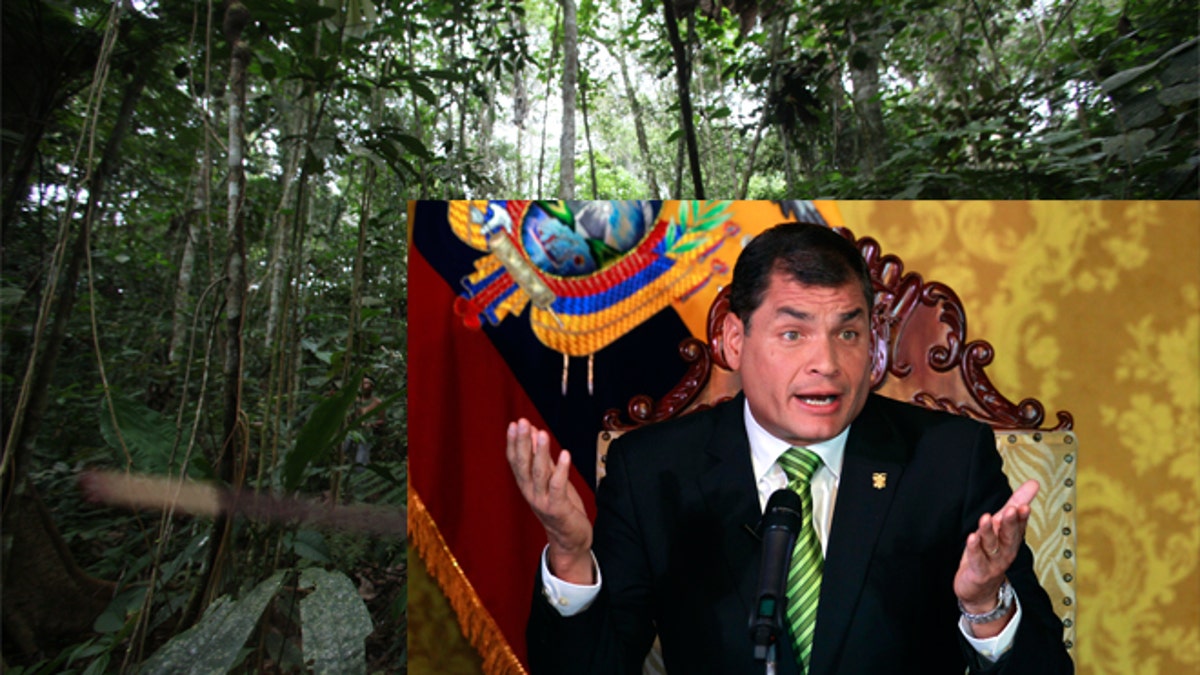
QUITO, Ecuador – President Rafael Correa has given the all clear for rich countries to begin drilling for oil in Ecuador's Amazon rainforest on Thursday, abandoning an ambitious 2007 plan he proposed to stop oil exploration in a pristine preserve.
Correa had sought $3.6 billion in contributions to maintain a moratorium on drilling in the remote Yasuni National Park, which was declared a biosphere reserve by the United Nations in 1989 and is home to two Indian tribes living in voluntary isolation.
Environmentalist had hailed the initiative when Correa first proposed it in 2007, saying he was setting a precedent in the fight against global warming by lowering the high cost to poor countries of preserving the environment.
But he said Thursday evening that Ecuador had raised just $13 million in actual donations in pledges and that he had an obligation to his people, particularly the poor, to move ahead with drilling. The U.N. and private donors had put up the cash.
"The world has failed us," Correa said in a nationally televised speech. He said the global recession was in part responsible but chiefly blamed "the great hypocrisy" of nations who emit most of the world's greenhouse gases.
"It was not charity that we sought from the international community, but co-responsibility in the face of climate change."
Correa said he was proposing to the National Assembly, which his supporters control, oil exploration in Yasuni amounting to less than 1 percent of its 3,800 square miles
His no-drilling plan had envisioned rich countries paying Ecuador half the $7.2 billion in revenues expected to be generated over 10 years from the 846 million barrels of heavy crude estimated to be in Yasuni.
Not drilling in the reserve would keep 410 million metric tons of carbon dioxide from entering the atmosphere, officials had said during their global lobbying campaign that included organizing tours of the reserve for journalists.
But while Correa's proposal generated interest, there were few takers, in part because he insisted that Ecuador alone would decide how the donations would be spent. European countries expressed the most interest but still balked.
Ecuador is an OPEC member that depends on oil for a third of its national budget. The three oil fields in Yasuni represent 20 percent of its oil reserves.
Political analyst Jose Fuentes of the Flacso university in Quito said Correa had opted "for economic pragmatism" in abandoning the environmentalist image he had wished to project internationally.
Matt Finer, a scientist at the U.S.-based Center for International Environmental Law, expressed dismay at the decision.
"It is deeply disappointing that this alternative model for dealing with oil and gas reserves in mega diverse rainforests did not work," he said via email from Peru. "The Yasuni-ITT Initiative was the lone exception to the relentless expansion of hydrocarbon projects deeper into the most remote tracts of the western Amazon. Now there is really no viable alternative to stop the wave of drilling slated for the most biodiverse region of the world."
Despite championing the project, Correa is not perceived domestically as much of an environmentalist. He has also upset indigenous groups with plans to develop major mining projects for the first time.
Indigenous and environmental groups in Ecuador, a nation of 14 million people, have said that any decision on the fate of Yasuni should be made in a national referendum.
Patricio Chavez, director of the environmental group Amazonia por la Vida, criticized Correa for leaving potential donors a single option: "Pay or we drill."
Yasuni is not the only oil drilling that Correa's government plans in the rainforest. He is also seeking to auction oil concessions in 13 blocks of 770 square miles each south of Yasuni closer to the border with Peru.
Oil is Ecuador's chief source of foreign earnings. The country produces 538,000 barrels of crude a day, delivering nearly half its production to the United States.
Based on reporting by the Associated Press.
Follow us on twitter.com/foxnewslatino
Like us at facebook.com/foxnewslatino








































